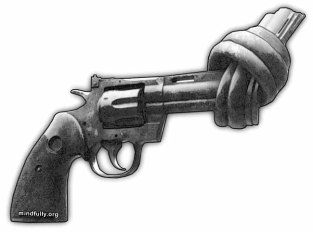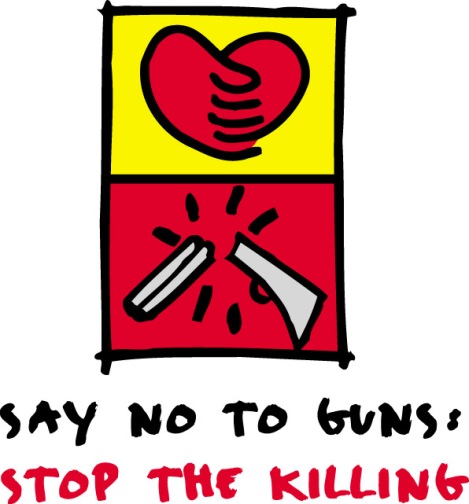Author’s Note: I wrote this piece originally on July 21st, 2012 in response to the Aurora, Colorado shooting at the screening on The Dark Knight Rises. It has since been updated to reflect the horrific actions in Newtown, Connecticut.
I feel an innate responsibility to comment on the shooting yesterday. Some people are going to say that now is not the time to talk about gun control. But when would be a good time? People are shot and killed every day in this country. To say that “now is not the time” is just as “political” as to begin talking about gun control–only, as Ezra Klein put it in his blog yesterday, it is to argue for the politics of the status quo. So let’s start talking. As this year (2012) comes to a close, it marks the worst year in mass shootings in modern United States history.
There were actually two horrific acts of violence at two different schools on December 14th, 2012. In one, a crazed gunman in Connecticut opened fire at an elementary school, killing twenty children and six adults before turning the weapon on himself. In the other, a man wielding a knife in a school in China stabbed 22 children.
People who defend unfettered gun rights in this country will talk about how violent people will use violence, regardless of the weapon. They will talk of how a man with no access to guns will still find weapons–in the case of the Chinese man, a knife–to commit their sick acts of violence.
To put it bluntly, this is sheer idiocy. The death toll in the Connecticut shooting? Twenty-eight. The death toll in the Chinese knifing? Between zero and three, as reports are conflicting. People who say that guns don’t kill people need to pull their heads out of the sand. People kill people when they use guns. People mostly injure people when they use alternative weapons. There is data to back this up, too: According to a study that was featured in the Journal of the American College of Surgery on “penetrating cardiac injuries,” someone who is shot in the heart has a 16% chance of surviving. If someone is stabbed in the heart, they have a 70% chance of living. If every person who used a gun to kill someone traded their weapon for a knife, the survival rates would quadruple immediately. As a side note: knives, ironically, are regulated. Switchblades remain illegal, while extended clips, armor piercing rounds, and semi-automatic and automatic firearms all remain legal.
Now on to the Aurora shooting, which had fewer deaths but far more injuries than the Newtown massacre. With over 70 people shot and twelve dead in the community of Aurora, Colorado, it marks one of the more violent attacks by a lone shooter in recent memory. Among the casualties: a pregnant mother and a six-month old child.
The gunman reportedly used extended clips—more bullets, more death, before he had to reload. Among the weapons he used: an assault style rifle with high-capacity magazines.
Imagine being in the theater, wondering when the shooting was going to stop, wondering when he’d run out of ammunition, only to hear him continue to pepper the crowd with death and pain.
The fact that he used the guns is due to some problem within his twisted mind. The fact that he bought the guns legally? Well that’s due to a different problem entirely—one that’s ours—and it’s one that needs to be reexamined before something like this can happen again.
According to a United Nations Report in the early 2000s, gun related deaths are EIGHT times higher in the United States than in countries that are economically and politically similar.
I understand the arguments that are bubbling up within some of you: “Guns don’t kill people, people kill people.” It’s the age-old argument from the NRA and gun-toters everywhere. In some ways, I agree with the argument. There needs to be stricter background checks, monitors, and safeguards to make sure that guns don’t get into the hands of the wrong person. But in a lot of ways, the argument is a load of crap. Here’s why:
The gunman easily passed any background test to get his weapons. His only run-in with the law was a speeding ticket. He had no criminal history and was a very smart med studen t. The gunman in Norway from Norway a while back, who murdered 77 people and injured another 319? He passed every background check and obtained his weapons legally even though he had been planning the attack for nearly a decade. Lesson? Background checks are hardly enough.
t. The gunman in Norway from Norway a while back, who murdered 77 people and injured another 319? He passed every background check and obtained his weapons legally even though he had been planning the attack for nearly a decade. Lesson? Background checks are hardly enough.
The second reason it’s a load of crap: Guns DO kill people. I agree that people kill people. It happens every day in this country. But people with guns kill others way more efficiently than people with other handheld weapons. This doesn’t even take into account the fact that guns can be used from great distances and that no one can stab or otherwise physically harm as quickly as certain legal semi-automatic weapons.
To turn defend semi-automatic weapons, extended clips, and even handguns using the Second Amendment is absurd. It was written by a group of people who used muskets and muzzle-loaders. The same people who wrote that into our constitution had no knowledge of the level of devastation that could be caused in a crowd by a single person and a single weapon. They did, however, create a system by which we could change the Constitution as times changed—they had the foresight to acknowledge that problems would arise that they had no ability to account for—and they saw that the Constitution was not timeless. Nor is it Gospel.
And if this is about “freedom,” please tell me how someone’s freedom to own a weapon is more important than the freedom of a six-month-old to not get shot. Please explain to the loved ones of the dead in this most recent tragedy how their fallen family members’ freedom to live is not worth more than a freedom to purchase a semi-automatic weapon.
Some argue that people who are hell-bent on creating disaster will do so anyway—ban guns and they will still find ways to get them.
But, the UK did just that—as a nation, they have some of the most restrictive gun policies on the planet. They have even banned handguns entirely. In the United States in 2009, the United Nations statistics record 3 intentional homicides per 100,000 inhabitants. The figure for the United Kingdom was 0.07—about 40 times lower.
I know that there are other factors to gun violence. I understand that murders would still occur, that people would still somehow get their hands on guns, and that people would still die. But it is entirely unacceptable that the United States would have a gun death rate as high as it is. In every major UN study since the 80s, The United States has had the highest amount of gun-related injuries than any industrialized nation. This will never be okay.
David Hemenway is the Health Policy Director at the Harvard School of Public Health and has studied violence prevention for over forty years. He writes that every nation that has stricter gun laws than the United States ultimately has lower homicide rates and lower gun deaths overall. In fact, “as a benchmark, in 2003, the United States homicide rate was seven times higher than that of these countries, largely because our firearm homicide rate was 20 times higher.”
He writes of a beautiful example in Australia: “Following the 1996 Port Arthur, Tasmania, massacre of 35 people, Australia acted quickly to effectively ban assault weapons. A mandatory buyback obtained more than 650,000 of these guns from existing owners. Australia also tightened requirements for licensing, registration, and safe gun storage of firearms. The result? In the 18 years before the intervention, Australia had 13 mass shootings. In the dozen years since, there has not been a single one. The laws also helped reduce firearm suicide and non-mass shooting firearm homicide.” (emphasis mine)
David Hemenway wrote about this in an Op-Ed piece for the Arizona Daily Star in 2011 following the shopping center shooting that killed six people and injured former U.S. Rep Gabrielle Giffords and 12 others.
And here we are, a year and a half later, with more mass shootings. How many times will we, as a nation, need to learn these lessons?
Enacting stricter laws would undoubtedly lower the death rates dramatically, just as it has in every other country that has stricter gun laws than the US. But even if we lowered the statistics a tiny bit, wouldn’t it be worth it to save a few lives?
Isn’t it worth it to even save one life? If you answer with a “no,” try explaining your reasoning to the crying parents and families of the victims of gun violence.
